Why is my dog constantly licking his front legs?! Have you ever seen your dog licking their front legs often and wondered what’s up? Many dogs do it, but it can make us worry.
Dogs lick their legs for many reasons. Sometimes, they’re bored; other times, it might be because something hurts or feels itchy. They’re trying to tell us something when they do this.
We will talk about 12 reasons dogs might keep licking their legs. We’ll closely examine each reason to help us understand our furry friends. We’ll also share some tips on making them feel better.
Whether you just got your first dog or have had dogs around you for a long time, knowing why they do this can help improve their lives. Let’s dive into why this happens and how we can help them feel better.
Why is My Dog Constantly Licking His Front Legs?
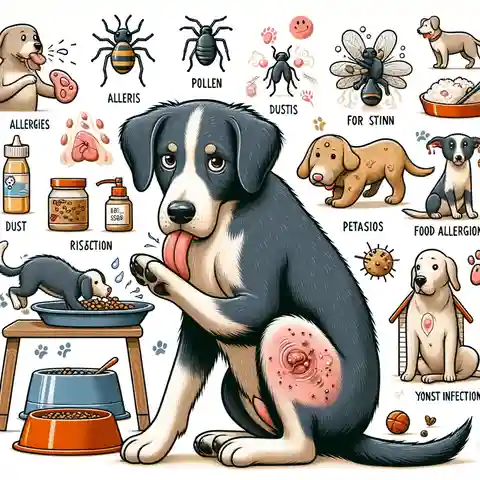
Here is main reasons why is your dog constantly licking his front legs?
1. Allergies
Dogs can be allergic to things like pollen, dust, or certain foods. These allergies make their skin itchy. To help stop the itch, dogs often lick their legs. But, licking too much can cause more problems, like skin infections. To help, we can change what they eat, give them special baths, and sometimes give them medicine from the vet.
2. Dry Skin
Sometimes, dogs get dry skin. This can happen when it’s cold and dry outside, they don’t eat the right fats, or they’re bathed with strong soaps. Dry skin makes them itchy, so they lick their legs to try and make it feel better. To help, we can give them food that’s good for their skin, use gentle shampoos, and maybe use a machine that adds moisture to the air.
3. Injuries
Dogs might lick their legs if they have a cut, scratch, or something sharp stuck in their fur. Licking helps clean the wound and can even help it heal faster. But, too much licking can make it worse. That’s why we should check them for boo-boos often and see the vet if we find something.
4. Pain
If a dog is hurting from things like sore joints, broken bones, or other inside hurts, they might lick their legs where it’s sore. This is their way of trying to feel better. If we notice our dog doesn’t want to play or has trouble getting up, it might mean they’re in pain. Seeing the vet can help find out why they’re hurting and how to make them feel better.
5. Anxiety
Dogs can feel worried or scared, just like us. When they do, they might lick their legs a lot because it helps calm them down. This worry can come from being alone too much, loud noises, or changes around them. To help them feel safer, we can play with them, keep things around them the same, and sometimes they might need medicine from the vet.
6. Parasites
Parasites like fleas or ticks can bite dogs and make their skin very itchy. Dogs lick their legs trying to get these bugs off. It’s important to keep dogs clean and use special treatments to keep these pests away.
7. Food Allergies
Some dogs can’t eat certain foods because it makes them itch all over. This is called a food allergy. When this happens, dogs lick their legs a lot to try and stop the itching. We might need to change their food to something that doesn’t make them itch.
8. Yeast
A yeast infection on the skin can make a dog’s skin super itchy. This is a kind of sickness that needs special medicine from the vet to get better. Dogs with yeast infections will lick their itchy spots a lot.
9. Behavioral Reasons
Just like some people bite their nails when they’re bored or nervous, dogs sometimes lick their legs for no reason other than habit. It’s something they do when they don’t have anything else to keep them busy or if they’re feeling stressed.
10. Infections
Dogs can get infections on their skin or paws that make them feel really itchy. They lick the spots to clean them, but sometimes licking isn’t enough, and they need medicine from the vet to heal.
11. Arthritis
When dogs get older, they might get arthritis, which makes their joints sore. They lick their legs where it hurts as a way to try and make the pain go away. It’s like when we rub something that hurts to feel better.
12. Boredom
Dogs need to play and walk to be happy. If they don’t get to do enough fun stuff, they might start licking their legs just because they’re bored. It’s important to play with them and take them for walks so they have lots to do.
13. Burns
Sometimes, dogs can get burns, like from walking on hot pavement or touching something they shouldn’t. They lick the burn because it feels a bit better when they do. But, burns can be serious, so a vet should check them to make sure they heal right.
14. Flea Allergies
Fleas can make dogs really itchy, especially if they’re allergic to flea bites. Just one flea bite can make them so itchy that they lick their legs a lot. Using flea prevention stuff helps keep the fleas away and stops the itch.
15. Itching
Lots of things can make dogs itchy, like having dry skin, being allergic to something, or just feeling dirty. When they’re itchy, they lick their legs to try and make it stop. Giving them a bath with a gentle shampoo made for dogs can really help them feel better.
Helping dogs stop licking their legs a lot means figuring out why they’re doing it and helping them with that problem. This might mean taking them to the vet, playing with them more, or giving them baths.
How to Keep Your Dog Happy and Healthy
If your dog is licking his legs a lot, here’s how you can help:
1. Visit the Vet
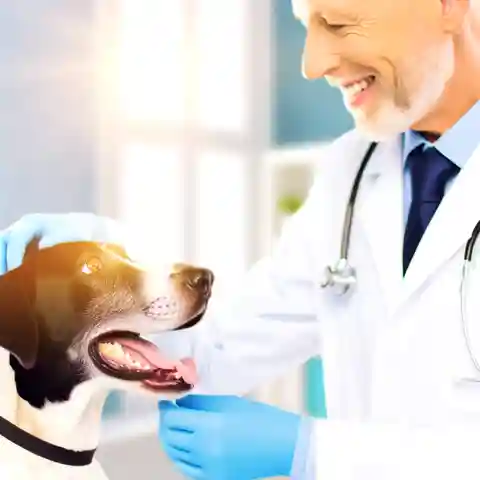
- Why It’s Important: A vet can check for any health issues that might be causing your dog discomfort. They can look for signs of infections, allergies, arthritis, or other conditions.
- What to Expect: The vet might do some tests, like skin scrapings or allergy tests, to find out what’s bothering your dog. They can then recommend the best treatment.
2. Good Diet

- Choosing the Right Food: Look for high-quality dog food that’s suitable for your dog’s age, size, and any special needs. Some dogs need special diets if they have allergies.
- Benefits: A nutritious diet helps keep your dog’s skin healthy and can prevent allergic reactions to food ingredients.
3. Skin Care
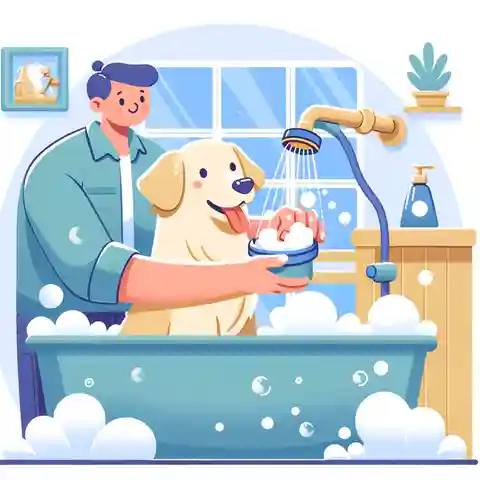
- Moisturizing: Dog-friendly moisturizers can help soothe and protect dry skin. Make sure any product you use is safe for dogs, as they might lick it off.
- Bathing: Use a gentle, dog-specific shampoo to keep your dog’s skin clean without stripping natural oils. Don’t bathe too often, as this can dry out their skin.
4. Pest Control
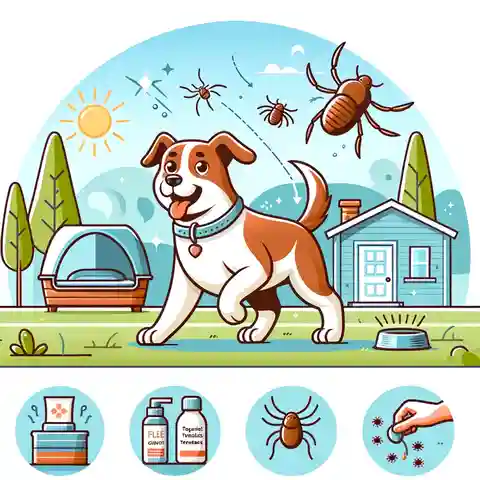
- Regular Treatments: Use vet-recommended flea and tick prevention year-round. These products come in various forms, like topical treatments, collars, or oral medications.
- Home and Environment: Keep your home and yard clean. Vacuum regularly and wash your dog’s bedding to reduce the risk of parasite infestations.
5. Comfort
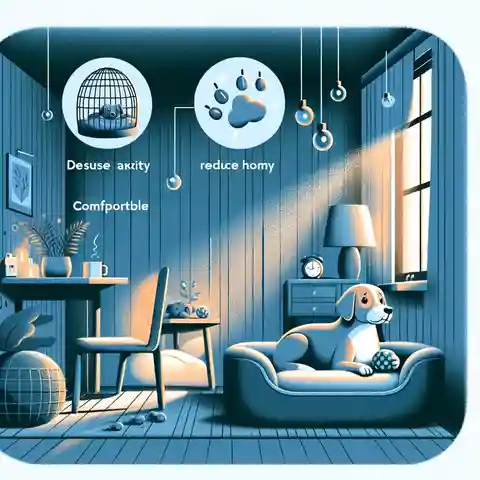
- Reduce Anxiety: Pay attention to signs of stress or anxiety in your dog. Provide a safe, comfortable space for them to relax.
- Attention and Activity: Spend quality time with your dog. Play games, go for walks, and ensure they have plenty of mental and physical stimulation to prevent boredom.
- Training and Routine: Dogs benefit from a regular routine and positive reinforcement training. This can help reduce anxiety-related behaviors, including excessive licking.
Additional Tips
- Monitor and Record: Keep an eye on how often your dog licks their legs and if it gets worse after certain activities or at specific times. This information can be helpful for your vet.
- Allergy Management: If allergies are a concern, consider an air purifier to reduce airborne allergens and wash your dog’s paws after walks to remove pollen or other irritants.
- Joint Care: For dogs with arthritis, consider supplements like glucosamine and chondroitin, and provide a comfortable resting area to ease joint pain.
By understanding the underlying cause of your dog’s behavior and taking appropriate steps, you can help relieve their discomfort and improve their quality of life.
Dogs lick their legs for many reasons, from allergies to Itching. If you’re worried about your dog, the best thing to do is talk to a vet. They can help figure out what’s going on and how to make your dog feel better. Remember, you know your dog best. If something seems off, it’s always better to check.
